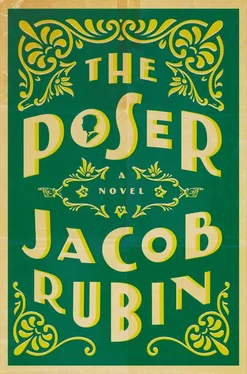“One day everyone will see you the way I do.”
She said this often.
“People don’t like me.”
“Not true.”
“I have no friends.”
“Friends are overrated. You’ll get some soon enough and see what I mean.”
“Giovanni,” Vandaline said.
“Yes?”
“I said, if everyone has this — this thread as you call it, this seam sticking out — well then, I must ask, what’s yours?”
The men leaned in. At the far end of the bar, Bernard raised a cigarette to his lips. I didn’t dare look at Lucy.
“Why,” I said. “I’m the exception.”
After high school, my mother’s friend Julius Weld helped me land a job at the train station in Dun Harbor, a dour nub of coastline twenty minutes south of Sea View. Mainly, I was relieved to finish school, where nearly every week I was banished to Derringer’s office. Too much stimulation, Mama said. The girls with their skirts and sculpted hair; the boys oily and mean. “Giovanni!” someone would howl, and I’d come to, like a boy who with every step knocked over an expensive vase.
As I soon discovered, my job as a ticket seller required me to utter the same pronouncements dozens of times a day: “We recommend getting to the track ten minutes before scheduled departure.” Or, “Kindly check the board for updates.” I kept to the ticket seller’s booth. I knew what to say, and if ever the old urge came over me, I dammed it with politeness: the simple rules that, once followed, erected a brick wall between you and the world. Excuse me, Good day . “After you,” I insisted, holding the door for all strangers, unless, of course, a man my senior insisted otherwise, in which case I dug my chin to my chest, said, “’Preciate it, sir,” and strode ahead.
Of course, this meant every businessman and runaway, every stubbly bachelor when buying a ticket unwittingly logged the details of their appearance with me. My politeness, I discovered, made for an acceptable disguise, so when wishing a man a good day, I could secretly relish each detail: the way he checked his watch, say, or slid change off the counter, sharing these bits with Mama at night.
Always she was my strongest encourager. If ever I got into trouble at school, she would tell all offended parties that I was sympathetic to the bone. This, her constant response to the hurricane of hair pulls, harangues, schoolyard exclusions, and teachers’ meetings I was always causing the world.
When I was four, for instance, Great Uncle Arthur, Mama’s only living relative, visited us from out west. A sigh punctuated each effort of his limbs, and the old man’s kiss he gave Mama sounded like tape being ripped from a wall. “Put it there,” he said, throwing out his hand. “You heard me, pardner, put it there,” I answered. “I heard about this,” Arthur said, turning to leave minutes after arriving. Mama jumped in front of him. “You can’t, Arthur. He’s just—”
Or at Susan Sanders’s June party. Lobster, shrimp, and steamers served in their never-ending backyard. The older children cavorting by the tire swing. I remember chasing a freckled girl with straw-colored ringlets around some oaks, believing if I caught her, my whole life would explode, and must’ve still been exhilarated by that chase when we gathered, fifty of us, around the red picnic table for Susan’s annual toast. Many wore white linen suits and pearls. Mama beamed at me from behind a cityscape of champagne bottles. The girl I’d chased was thumbing bits of brownie from between her teeth.
“A toast,” Susan said. On cue the adults raised their flutes of champagne, the children their glasses of chocolate milk or ginger ale. “We are just delighted everyone could make it,” she said, playing with her earrings. To speak Susan Sanders had to kick the grass or twist her legs around each other. But most of all, she couldn’t keep her hands off her earrings, and I often wondered what mute depths she’d sink to if parted from that essential jewelry. “A delight to have you. An absolute delight. With the money, the money, the friends, and the money,” I surprised myself by announcing, and soon all I could hear were the birds, and the mouths around the table were getting bigger until Mama draped her arms over my shoulders and said, “He means perfectly well. He’s just—”
Or when Mama and I attended Brad Mason’s funeral at the Sea View Cemetery, which sits atop one of the few real hills outside of town. Even with its weeds and jagged gravestones the cemetery provided a sort of grandeur because of its view. Seagulls ambled around between flights, like ducks. That day it was overcast and blustery. Me, in a blazer with brass buttons, Mama sniffling out of view. It was the tragedy of that year: Brad Mason, my ten-year-old classmate, smashed by a truck. The women had to keep one hand atop their wide-brimmed hats to prevent the wind from snatching them. The priest’s exact words were lost in the wind. You could hear his sincere voice but couldn’t make out the words. When he stopped speaking, Brad’s mother, behind a speckled veil, buckled to her knees and wept so that two handsome young men in black suits had to hoist her up; and soon they were glaring at me with iron mouths — Mrs. Mason, too, her eyes white as eggs under her veil — because I was buckling my knees and weeping to the sky; Oh, no, I think I was saying, Oh, no , and poor Mama had to explain — as she had to Uncle Arthur and Susan Sanders, as she had to so many people — that Giovanni, her son, was sympathetic to the bone. She even wrote a note that I was to keep in my pocket and present to people if ever things got out of hand.
By the time I began work at the train station I had gained control enough of my instincts to spare myself and others these outbursts, storing them for my performances with Mama. We had a ritual. After dinner, Mama would sit Indian-style on the couch while I cracked my neck and stretched as if we weren’t alone in our one-story house but center stage at the Sea View County Theatre. Mama might even shush imaginary attendees and then flick the lamp on and off, signaling the start of the show. To this day I wonder how those demonstrations appeared to any passerby chance may have placed at our picture window: a woman, they would have seen, upright as a piano teacher, yanking and steering her boy around with the strings of her words. “Tilt your head.” “ Sloshy hips.” “Raise it, yes! Perfect!”
Sometimes Mama even stopped by the train station to observe the exact way a favorite of ours doffed his cap or, say, lightly licked her finger, making a pleased expression of the mouth before turning a magazine’s glossy page. This was no mere indulgence. These field trips felt, if anything, like missions, akin to our jaunts to the movie theater, a sanctuary of my childhood. There all the dull bits of life had been excised, the world distilled to happening , a dream in which even homely acts — a body tossing in bed, say — rivaled a general’s howl for sheer immortality. There I could hike knees to chest and mirror it all. At a deserted matinee, I would sometimes even gallop through the aisle to hail a cab like the hair-flying prosecutor onscreen, Mama ogling me as much as the picture.
And yet, as I grew older, I preferred to stay in my movie-theater chair, watching like anyone else. Each moment like learning a new word. The way a man grabbed a woman’s shoulders before kissing her. The flashing eyes of a pursued driver in the rearview mirror. The correct style in which one combs a bronze coiffure after removing a hat. Or the way to set that hat down at the edge of the desk. Or, for that matter, the difference between the way an honest man sets a hat down on a desk and a liar does (the latter removing his hand right after, as if the lid might snap at him, then briefly rubbing his escaped hand with the other before slipping both in their respective pockets, whistling and pacing with shifty eyes).
Читать дальше












